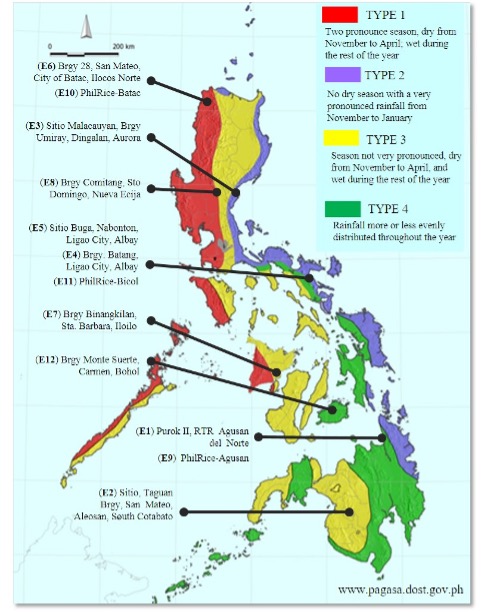VOLUME 17 NUMBER 2 (July to December 2024)

SciEnggJ. 2024 17 (2) 286-294
available online: December 23, 2024
DOI: https://doi.org/10.54645/2024172UJK-59
*Corresponding author
Email Address: imeldalyn.pacada@gmail.com
Date received: March 11, 2024
Date revised: October 3, 2024
Date accepted: November 3, 2024
ARTICLE
Assessing yield variation in rice varietal mixtures (VarMix®) and single varieties across 12 environments using AMMI analysis
Research Institute, Central Experiment Station, Maligaya,
Science City of Muñoz, Nueva Ecija, 3119 Philippines
2Philippine Rice Research Institute, Midsayap Experimental Station,
North Cotabato, Philippines
Traditionally, rice cultivation has heavily relied on single varieties tailored for specific traits, yet these approaches have demonstrated limitations in resilience and stability. Embracing variety mixtures (VarMix) allows us to leverage genetic diversity, thereby enhancing yield stability, bolstering pest and disease management, and optimizing resource efficiency, ultimately fostering more sustainable and resilient rice production systems. This study investigates the performance of 12 rice varietal mixtures and single varieties across 12 distinct environments using the Additive Main Effects and Multiplicative Interaction (AMMI) approach, integrating variance and principal component analyses (PCA). The analysis reveals environmental factors as the predominant driver of genetic variation, with significant contributions to rice yield dynamics. Notably, genotypes such as NSIC Rc298 (A), NSIC Rc298: NSIC Rc214: NSIC Rc216 (ABC), and NSIC Rc214: PSB Rc82: NSIC Rc238 (BDE) consistently exhibited high yield across multiple environments. Furthermore, varietal mixtures, particularly BDE, demonstrated both high yield and stability, highlighting the potential of mixed genotypes in enhancing agricultural resilience. The findings underscore the importance of tailored breeding strategies and environmental considerations in maximizing rice yield and stability, contributing to sustainable crop production practices and food security initiatives.
© 2026 SciEnggJ
Philippine-American Academy of Science and Engineering